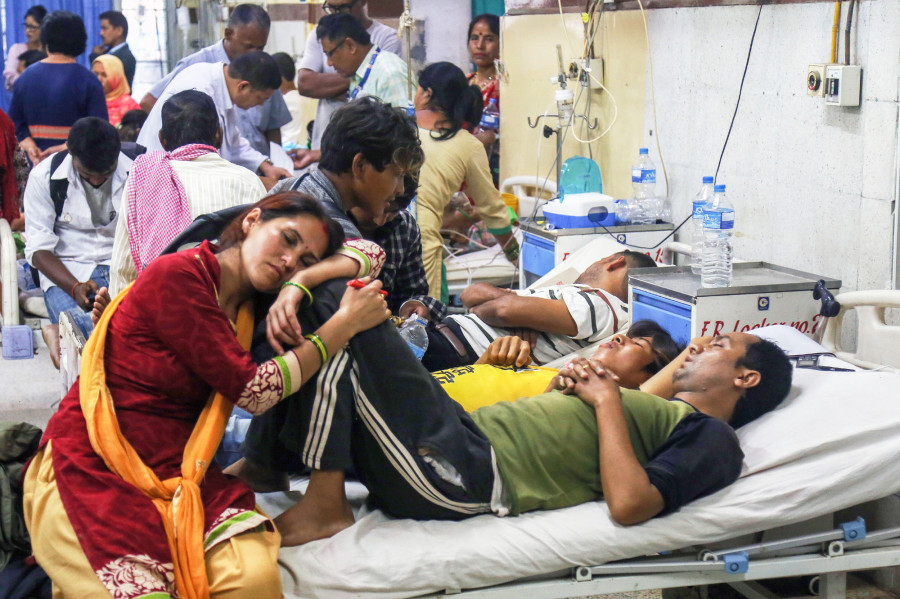Health
Dialysis service is free but patients are being charged
Over 50 hospitals, nursing homes and dialysis centers run by non-governmental organisations throughout the country had signed agreements with the Health Ministry to provide free service.
Arjun Poudel
After her both kidneys stopped functioning some two months ago, Kalpana Gautama, who hails from Chandrapur Municipality of Rautahat district, has been living in Kathmandu for dialysis service.
Gautam, 49, has to undergo dialysis twice a week and has been compelled to pay on her own.
“I am in a very difficult condition financially,” her husband Ramkrishna told the Post, over the phone. “We are paying for the service that is supposed to be free as per the government.”
The government started Bipanna Nagarik Kosh after the 2006 People’s Movement to provide financial relief to the people suffering from serious ailments that are too expensive for treatment. Cancer, renal failure, Alzheimer’s disease, Parkinson’s disease, head and spinal injury, sickle cell anaemia, stroke are covered under this programme.
“The government spends over Rs2 billion for the treatment of the eight serious ailments,” Roshani Laxmi Tuitui, director at the Nursing and Social security Division under the Department of Health Services, told the Post. “Of the total amount allocated for treatment of eight diseases, over 52 percent is spent on kidney disease.”
Apart from free dialysis service, the Health Ministry provides financial assistance for transplantation and medication.
“We heard that the government provided free service but hospitals say that their quota of the government programme has finished,” Gautam’s husband Ramkrishna, complained. “I had taken my wife to Bir Hospital and Tribhuvan University Teaching Hospital, but there was already a long queue of patients waiting for their turn.”
Over 50 hospitals, nursing homes and dialysis centers run by non-governmental organisations throughout the country have signed agreements with the Health Ministry to provide free service.
But officials at the ministry say those institutions are now charging the patients.
“During lockdown, they provided just two hours of dialysis service and took full payment from the government. The government reimbursed them without any questions,” the official said, asking not to be named. “ Now they are forcing the patients to pay for the service.”
Dr Rishi Kumar Kafle, executive director of the National Kidney Centre, says the centre is compelled to charge the patients because the government has not been reimbursing for the service.
“The Health Ministry has not paid dues of our several dialysis centers since the start of the ongoing fiscal year,” he told the Post.
The center operates around half a dozen dialysis centers in various districts.
“The government neither increased the dialysis charge nor paid the amount on time,” Kafle said. “We have stopped providing free service to new patients for the last two months for which we have to seek reimbursement from the government. We provide the service to the patients who are ready to pay.”
Dialysis centres charge Rs 3,500 or more of each session of dialysis but the Health Ministry provides Rs 2,500 in reimbursement.
Kafle complained that the government allowed private hospitals to charge an additional 50 percent for the service in the pandemic but did not allow the dialysis centre to charge an additional amount.
Tuitui, director at the Nursing and Social security Division, however, said that her office had not halted reimbursement for any dialysis centres.
“Ask them, if those centres have renewed their licence and permission to provide the service,” said Tuitui. “Every agency functioning in the country has to follow the state rules and regulations and it is applied to dialysis centres too. We have asked them to renew their licence and permission.”
Around 6,000 patients having renal failure have been taking free dialysis services throughout the country.
“Patients who have to undergo dialysis regularly to survive cannot wait for the disagreement between the government agencies and hospitals to settle,” complained Ramkrishna.




 19.35°C Kathmandu
19.35°C Kathmandu















